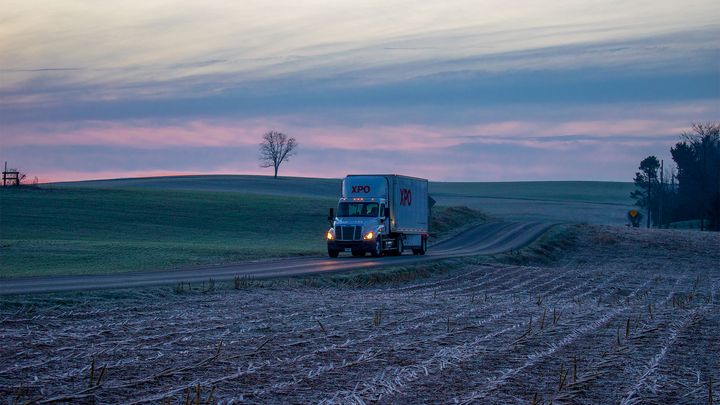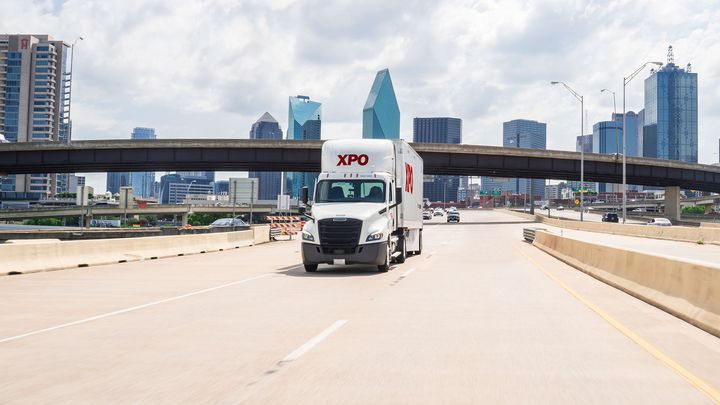XPO Logistics Announces Senior Leadership for Logistics Segment Spin-Off
XPO Logistics, Inc. (NYSE: XPO), a leading global provider of transportation and logistics solutions, today announced the senior leadership team for the intended spin-off of the company’s logistics segment. The following XPO executives will transition to their respective roles, subject to completion of the planned transaction:
- Malcolm Wilson, currently chief executive officer of XPO Logistics Europe, will become CEO of the new company’s global business. Wilson has three decades of executive experience managing multinational supply chain operations. Under his leadership, XPO’s European logistics business has achieved unprecedented growth and efficiencies. Wilson joined XPO in 2015 through the company’s acquisition of industry leader Norbert Dentressangle, where he was head of the logistics division and a member of the executive board. He grew the logistics division to global scale as Norbert Dentressangle’s largest revenue-producing unit.
- Richard Cawston is XPO’s president, supply chain logistics – Europe, and will continue in this role with the new company. Cawston joined XPO through the Norbert Dentressangle acquisition in 2015. He initially served as managing director of XPO’s logistics operations in the UK and Ireland before assuming leadership of the broader European logistics network. His 20-year career includes deep expertise in the e-commerce sector, where XPO is the European logistics leader in outsourced fulfillment.
- Ashfaque Chowdhury is XPO’s president, supply chain logistics – Americas and Asia Pacific, and will continue in this role with the new company. Chowdhury had 20 years of senior experience with New Breed Logistics when he joined XPO in 2014, initially serving as chief information officer for the logistics segment. As head of North America, Latin America and Asia, he has transformed logistics into a data-driven business and leads the implementation of cutting-edge supply chain solutions for some of the world’s largest companies.
As previously announced, XPO expects to complete the spin-off in the second half of 2021, creating a separate, publicly traded logistics company. Its board of directors will be chaired by Brad Jacobs, who will continue to serve as chairman and chief executive officer of XPO Logistics.
Jacobs said, “Malcolm, Richard and Ashfaque are highly innovative leaders who are recognized as best-in-class by blue-chip customers. This team has worked together for years, and is ideally suited to unlock the growth opportunities in the standalone company. They have a long track record of creating sustainable value in the business through sophisticated operations, including advanced automation and digital warehouse management.”
Post-separation, the new company will be the second largest contract logistics provider in the world, with a value proposition that includes cutting-edge technology, leading capabilities in e-commerce, food and beverage, consumer electronics, industrial and reverse logistics, and the XPO Direct shared distribution network. XPO’s logistics segment currently has approximately 212 million square feet (20 million square meters) of space at 890 locations worldwide.
About XPO Logistics
XPO Logistics, Inc. (NYSE: XPO) is a top ten global logistics provider of cutting-edge supply chain solutions to the most successful companies in the world. The company operates as a highly integrated network of people, technology and physical assets in 30 countries, with 1,629 locations and more than 100,000 employees. XPO uses its network to help more than 50,000 customers manage their goods most efficiently throughout their supply chains. XPO's corporate headquarters are in Greenwich, Conn., USA, and its European headquarters are in Lyon, France. Visit xpo.com for more information, and connect with XPO on Facebook, Twitter, LinkedIn, Instagram and YouTube.
Forward-looking Statements
This press release includes forward-looking statements within the meaning of Section 27A of the Securities Act of 1933, as amended, and Section 21E of the Securities Exchange Act of 1934, as amended. All statements other than statements of historical fact are, or may be deemed to be, forward-looking statements, including the statements above regarding plans, benefits and timing of the contemplated spin-off transaction. In some cases, forward-looking statements can be identified by the use of forward-looking terms such as “anticipate,” “estimate,” “believe,” “continue,” “could,” “intend,” “may,” “plan,” “potential,” “predict,” “should,” “will,” “expect,” “objective,” “projection,” “forecast,” “goal,” “guidance,” “outlook,” “effort,” “target,” “trajectory” or the negative of these terms or other comparable terms. However, the absence of these words does not mean that the statements are not forward-looking. These forward-looking statements are based on certain assumptions and analyses made by the company in light of its experience and its perception of historical trends, current conditions and expected future developments, as well as other factors the company believes are appropriate in the circumstances.
These forward-looking statements are subject to known and unknown risks, uncertainties and assumptions that may cause actual results, levels of activity, performance or achievements to be materially different from any future results, levels of activity, performance or achievements expressed or implied by such forward-looking statements. Factors (including risks, uncertainties and assumptions) that might cause or contribute to a material difference include the expected benefits and costs of the intended spin-off transaction, the expected timing of the completion of the spin-off transaction and the transaction terms, the risks discussed in our filings with the SEC and the following: the severity, magnitude, duration and aftereffects of the COVID-19 pandemic and government responses to the COVID-19 pandemic; public health crises (including COVID-19); economic conditions generally; competition and pricing pressures; our ability to align our investments in capital assets, including equipment, service centers and warehouses, to our customers' demands; our ability to successfully integrate and realize anticipated synergies, cost savings and profit improvement opportunities with respect to acquired companies; our ability to develop and implement suitable information technology systems and prevent failures in or breaches of such systems; our substantial indebtedness; our ability to raise debt and equity capital; our ability to implement our cost and revenue initiatives; our ability to maintain positive relationships with our network of third-party transportation providers; our ability to attract and retain qualified drivers; litigation, including litigation related to alleged misclassification of independent contractors and securities class actions; labor matters, including our ability to manage our subcontractors, and risks associated with labor disputes at our customers and efforts by labor organizations to organize our employees; risks associated with our self-insured claims; risks associated with defined benefit plans for our current and former employees; fluctuations in currency exchange rates; fluctuations in fixed and floating interest rates; fuel price and fuel surcharge changes; issues related to our intellectual property rights; governmental regulation, including trade compliance laws, as well as changes in international trade policies and tax regimes; governmental or political actions, including the United Kingdom's exit from the European Union; and natural disasters, terrorist attacks or similar incidents. All forward-looking statements set forth in this release are qualified by these cautionary statements and there can be no assurance that the actual results or developments anticipated by us will be realized or, even if substantially realized, that they will have the expected consequences to or effects on us or our business or operations. Forward-looking statements set forth in this release speak only as of the date hereof, and we do not undertake any obligation to update forward-looking statements to reflect subsequent events or circumstances, changes in expectations or the occurrence of unanticipated events, except to the extent required by law.


